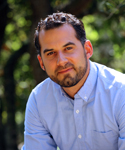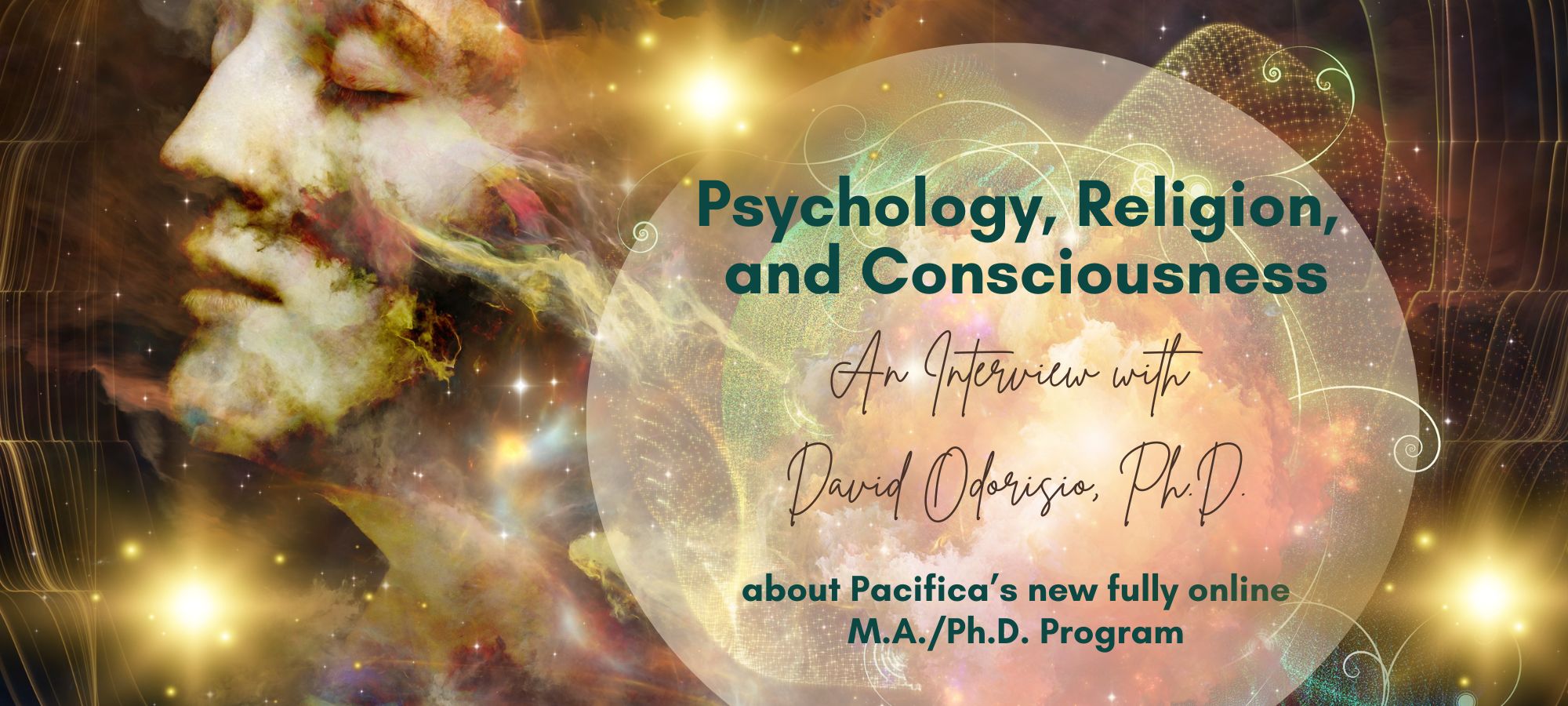David Odorisio, Ph.D., currently the Chair of Pacifica’s Mythological Studies program, will be leading the launch of a new M.A./Ph.D. program in Fall 2025, in Psychology, Religion, and Consciousness. I’m delighted to hear more about this ground-breaking development.
Angela: I am truly excited by Pacifica’s new offering, Psychology, Religion, and Consciousness (PRC) Online M.A./Ph.D. program, beginning in Fall 2025. What inspired you to start this program and offer it fully online?
David: The initial inspiration for the program arose during a think tank that convened several years ago. Part of the conversation oriented around the question, “Why Pacifica and why now?” The discussion produced several key words among faculty, including, “consciousness,” “transdisciplinarity,” and “transpersonal.” These terms emerge from distinct fields and disciplines but relate to the wider umbrella of depth psychology while simultaneously expanding Pacifica’s focus beyond strictly depth psychological perspectives. The study of “consciousness” considers the nature of mind beyond “the unconscious,” while still including it as viable area of inquiry. The PRC program widens the frame to consider non-ordinary states of consciousness, including the expansion or alteration of consciousness. We look at things like near-death experiences and the implications of psychedelics and the nature of mind. The program has a strong orientation towards Jungian psychology but considers alternative approaches to the study of human consciousness as well, including how the diversity of religious traditions and spiritual practices point towards various transformations of consciousness.
Angela: How will it differ from the Mythological Studies program, which you currently Chair, or the Jungian and Archetypal Psychology program, which is also launching a new online track?
David: This program is different from Pacifica’s Mythological Studies and Jungian and Archetypal Studies programs in several ways. Mainly in that the PRC program expands the scholarly perspective or “toolkit” beyond comparative mythology and Jungian and archetypal psychology. These are adjacent and related areas, but the PRC program emphasizes a comparative approach to religious studies and religious experience while also treating fields of psychology not approached in other programs, for example, transpersonal psychology. The PRC program also does not offer specific courses on comparative mythology; emphasizing instead spiritual practice and religious experience.
Angela: When you say “religious,” I assume you mean all religions are welcome?
David: Yes, of course. One of the classes I am most excited about is the seminar on Comparative Mysticism. This course considers religious or spiritual phenomena from a diverse variety of perspectives – including those from outside of traditional religious contexts. There is also a rich history of engagement between psychoanalysis and mysticism, which is also treated in depth. That is something that is unique to the PRC program at Pacifica.
Angela: Can you speak a little bit about why you chose to make this an online program?
David: We want this program to be as accessible as possible. Also, with the climate crisis at the forefront of our thinking, there is a responsibility to minimize impact on the environment, particularly through travel. The accessibility of an online program also opens possibilities for a national and international cohort —a truly diverse student body with the potential for global perspectives. The possibilities are incredible for what this can look like.
Angela: Would you speak to the qualifications for admissions and program accreditation?
David: The PRC program is fully approved by our accreditors and is a non-licensing degree program that is theoretical and research-based in its orientation. It teaches students how to be researchers and scholars at a professional level. With that said, if someone is already a licensed therapist, this program would be an excellent addition to their practice. The basic qualification for admissions is a bachelor’s degree in a related discipline, a master’s degree is not necessary. If applicants already have a master’s degree, they still need to complete coursework for the PRC MA, since the program is a combined MA/Ph.D. program. The first two years of coursework include the master’s degree, and the third year of the program prepares students for the PhD, followed by two years of dissertation writing. It takes five years total – typically – to complete the degree. Additionally, there is no summer quarter, so that provides a break for students. The program will have capped attendance to create a viable and supportive online learning community. Applicants are therefore encouraged to apply prior to June 1.
To read Part 2 of this interview, click here. And read more about the program here. Enrolling for Fall 2025.

David M. Odorisio, is Co-Chair and Associate Core Faculty in Pacifica’s Mythological Studies graduate degree program. David is editor of Thomas Merton in California: The Redwoods Conferences and Letters (Liturgical Press, 2024), A New Gnosis: Comic Books, Comparative Mythology, and Depth Psychology (Palgrave Macmillan, 2022), Merton and Hinduism: The Yoga of the Heart (Fons Vitae, 2021), and co-editor of Depth Psychology and Mysticism (Palgrave Macmillan, 2018). He has published in Quadrant, Jung Journal, Philosophy East and West, The Journal of Transpersonal Psychology, and The International Journal of Transpersonal Studies, among other peer-reviewed journals. He currently teaches the following courses in the Mythological Studies program: Methods and Contemporary Issues in Religious Studies; Christian Traditions; and Dissertation Formulation.

Angela Borda is a writer for Pacifica Graduate Institute, as well as the editor of the Santa Barbara Literary Journal. Her work has been published in Food & Home, Peregrine, Hurricanes & Swan Songs, Delirium Corridor, Still Arts Quarterly, Danse Macabre, and is forthcoming in The Tertiary Lodger and Running Wild Anthology of Stories, Vol. 5.


